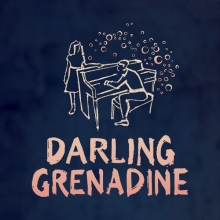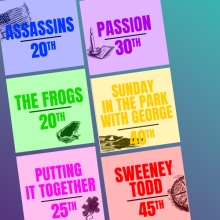
Full Synopsis
Sixty-year-old Gertrude Stein is lecturing at the University of Chicago in November of 1934. She begins to reflect upon her life in college and, as she does so, a younger version of herself appears ("A Sonatina Song"). Gertrude then explains that she became interested in psychology while battling boredom during her time at medical school. When observing different types of people, she would notice that everybody said the same things, over and over again, and became interested ("Loving Repeating"). Through this, she started to find that observing this repetition helped her understand society and the people in it ("There Are Many That I Know"). Young Gertrude expands on the concept by suggesting that, if everyone is always repeating, then they should all have the same history ("The History of One").
Young Gertrude suddenly catches sight of a thirty-year-old Alice B. Toklas. They begin to fall in love ("A Sonatina Song – Reprise"). Alice recounts meeting Gertrude and how well the two worked in love ("A Sonatina Song – Second Reprise / A Lyrical Opera Made by Two to Be Sung – Setting"). We begin to see the connection and story of the two women played out, as Gertrude guides us through what she calls scenes 1, 2, 3 and 4 ("My Wife Is My Life / Come Fire Fly / A Large and Loose Caramel / A Cow Coming"). Gertrude then brings us to what she has titled the Finale ("A Lyrical Opera – Finale").
As this section comes to a close, Gertrude tells a story about a dinner party that she attended in Beverly Hills. At the party, they ask her questions about how she got so much publicity and why she doesn't write the way that she talks ("Kiss My Lips She Did"). We see more interaction between Young Gertrude and Alice, with Gertrude involved this time ("The Thirteenth of April"). The trio then have a conversation about how nothing is important, but love ("As a Wife Has a Cow"). Gertrude then re-establishes how people love to repeat certain things, since that it is a natural part of life ("Do They as They Do So").
Gertrude tells a story about a time that T.S. Eliot came to see her, claiming that he would only publish her most recent piece in The Criterion. Gertrude then decides to to write a portrait of T.S. Eliot, entitled The Fifteenth of November, so that it would be clear that the piece was written on the very day that he saw her. However, they didn't print it, and it ended up being printed the following October ("The Fifteenth of October / As a Wife Has a Cow – Finale").
Next, Gertrude begins commenting on poetry and what it is like to write it now. As she is discussing, Young Gertrude and Alice reappear but they are now middle-aged ("Kiss My Lips She Did – Reprise"). The two tell the story of Miss Furr and Miss Skeene, about the love between two women ("Miss Furr and Miss Skeene"). Gertrude then introduces a group of men that Miss Furr and Miss Skeene went around with regularly ("Men – Part 1"). She goes on to explain that Miss Furr and Miss Skeene eventually stopped living together and went their separate ways ("Men – Part 2 /Such a One / Ending – Miss Furr and Miss Skeene").
We come upon an even older Young Gertrude, who is discouraged because she feels that there is no way to get a full history of anyone ("Loving Repeating – Reprise"). Alice proceeds to join Young Gertrude in helping her get through her sadness ("Lifting Belly"). Finally, Gertrude approaches the lectern and resumes her lecture; as she does so, Alice is revealed as an old woman ("A Bun for My Bunny"). Gertrude wonders if it's possible to describe every type of human being in relation to other human beings ("Finale – Part 1: A Sonatina Song"). Alice approaches the lectern and tells about the last time that she ever saw Gertrude... being wheeled into an operating room ("Finale – Part 2: Kiss My Lips She Did").
Show History
Inspiration
Gertrude Stein was an American author who lived from 1874 to 1946. Despite being less well known in her lifetime than friends and contemporaries, such as Picasso, she is now remembered as a creative, innovative writer in American literature. One of her most famous works was The Autobiography of Alice B. Toklas, Toklas being her life partner. Loving Repeating, according to composer, Stephen Flaherty, "follows the life, the loves and creative spirit of Gertrude Stein as seen through her relationship with Alice B. Toklas. Every word in the piece is [by] Stein. It's taken from a variety of texts: poems, speeches, letters, journal entries. All of the words are by Stein, except the very, very end of the piece where the final monologue is Alice B. Toklas' words about the end of Gertrude Stein's life." Director, Frank Galati, adapted the piece in part from a 1934 lecture that Stein delivered at the University of Chicago.
Productions
Loving Repeating began at Northwestern University in 2003, where it was developed under the title, A Long, Gay Book. Galati was a theatre professor there at the time.
Loving Repeating then premiered in Chicago in 2006 as a co-production and co-presentation by About Face Theatre and the Museum of Contemporary Art (MCA). It ran at the MCA from February 14 through March 12.
The next major production was done by the International City Theatre in Long Beach, California, at the Long Beach Performing Arts Center. The show ran from January 21, 2011, through February 13, 2011.
Cultural Influence
- A cast recording featuring the original Chicago cast was released on January 9, 2007.
- A published edition of the script, credited to Frank Galati as a dramatic adaptation of Gertrude Stein's work, came out in August of 2009.
Trivia
- Galati and Flaherty had previously collaborated on the Tony Award-winning Ragtime before coming together to work on Loving Repeating.
- Loving Repeating is the only full-length, professionally produced musical that Stephen Flaherty has written without his frequent lyricist partner, Lynn Ahrens.
- The original creative team for the About Face Theatre production of Loving Repeating included choreographer, Liza Gennaro, and music director, Thomas Murray. The original cast featured Chicago veteran, Cindy Gold, as Gertrude Stein, Jenny Powers as Alice B. Toklas and Christine Mild as the young Gertrude Stein.
Critical Reaction
"A love story, told with lyricism, grace and good humor."
– Los Angeles Times
"As sung by a top-shelf cast of eight accompanied by music director Tom Murray's five-piece orchestra (that sounds much bigger, thanks to the orchestrations by Flaherty and Brad Haak), it s enough just to listen to Flaherty's score for the seventy-five minutes of the piece."
– Talkin' Broadway, Chicago
Connect
Billing
- Music by
- Lyrics by
- Adapted and Directed by
Requirements
Video Warning
In accordance with the Performance License, you MUST include the following warning in all programs and in a pre-show announcement:ANY VIDEO AND/OR AUDIO RECORDING OF THIS PRODUCTION IS STRICTLY PROHIBITED.
Included Materials
| Item | Quantity Included |
|---|---|
| LIBRETTO/VOCAL BOOK | 12 |
| PIANO CONDUCTOR'S SCORE | 2 |
Production Resources
| Resource |
|---|
| HOW DOES THE SHOW GO ON-10/CS |
| HOW DOES THE SHOW GO ON? |
| REFERENCE RECORDING |
STANDARD ORCHESTRATION
| Instrumentation | Doubling |
|---|---|
| CELLO | |
| GUITAR | |
| KEYBOARD 2 | |
| REED 1 |




